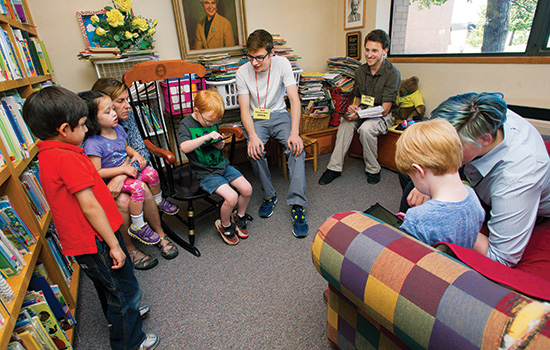MAGIC brings student products to market
A. Sue Weisler
Kyle Zarnoch, center, David Amata and Jacob Westerback play-test their tablet-based educational game with youngsters from RIT’s Margaret’s House.
David Amata, Jacob Westerback and Kyle Zarnoch are inching closer to seeing their video game in the hands of eager young learners in developing countries.
The two RIT students and Zarnoch ’15 (new media interactive development) created the educational app Remy and the Book of Rhymes in a class project that morphed into a fully realized product when it launched on the Google Play store in August.
The project was one of four funded by a $50,000 gift from individual members of the RIT Board of Trustees to launch the Co-Up program, a new program in which students get funding and support to bring their ideas to commercial scale and to explore creating businesses around them. The program is funded by the RIT Center for Media, Arts, Games, Interaction and Creativity (MAGIC) and the Simone Center for Student Innovation and Entrepreneurship.
Apps such as Remy are being published through MAGIC’s commercial game studio, MAGIC Spell Studios. In addition, the app is now slated to be part of Curious Learning, a Global Literacy Project whose mission is to reduce global poverty and promote education by teaching people to read.
In this case, tablets with various educational, literacy applications—like Remy—will be deployed to remote villages throughout Africa.
“We saw that there was a gap within teaching software—namely how learners use rhyme patterns and the connections they make with sounds,” said Amata, a fourth-year game design and development major from Columbus, Ohio. “We built our game around the importance of that concept, while incorporating a fantasy world the kids can interact with and save.”
Remy and the Book of Rhymes is a 2D tower defense game in which players defend villages against the “Unread,” monsters with words on them. Each monster is missing part of its word and in order to neutralize the threat, players must find the correct letter or rhyme and place it on the monster to complete the word. Players learn alongside a boy named Remy and Zazz, a lovable talking lion.
Westerback, a fourth-year game design and development major from New York City, loves the notion of fitting together game development “puzzle pieces” to create a captivating product.
“We gave this game a real personality,” added Zarnoch. “All of the art has been perfected; it looks like a real village and we’ve cleaned up the mechanics of the game, emphasizing vowel groups, rhyme patterns and repetition, so the kids can maximize their learning.”
The team has big plans for the game, which includes having Remy and Zazz teach advanced reading in volume two, as well as additional subjects and languages. But they are also prepared for the possibility that they may need to hand the project off to the next generation of capable young game designers and developers to continue the game’s evolution. Amata believes the recent pledge to build MAGIC Spell Studios is an encouraging sign for the future of the industry and game designers and developers everywhere.
“There is a real commitment to the video game industry as an emerging market,” he said. “The enhancements in technology and entertainment show how far we’ve come within the industry, and education will continue to play a big role in that development.”
On a personal note, Amata said helping to develop the game is just the first of many steps he’ll take toward making a meaningful career out of a childhood fascination.
“Making games that people love to play will be my legacy.”















